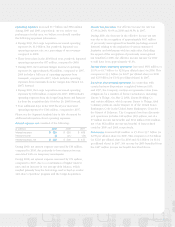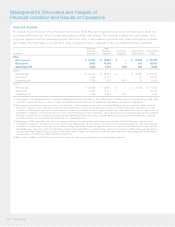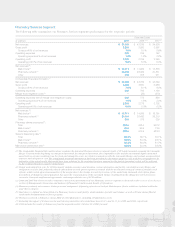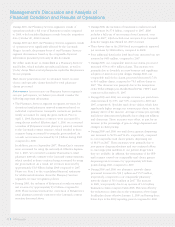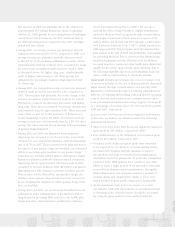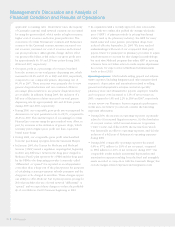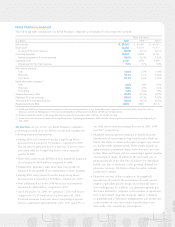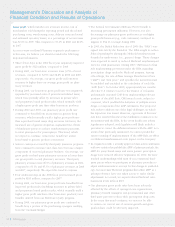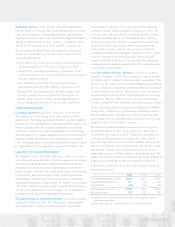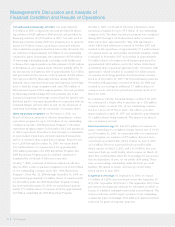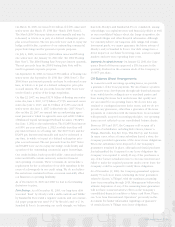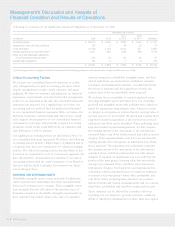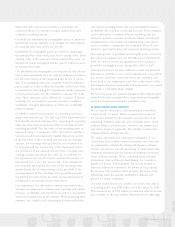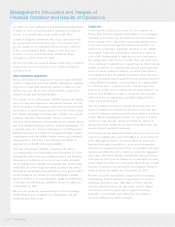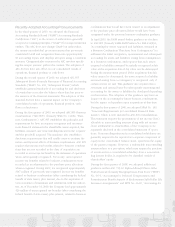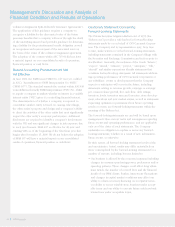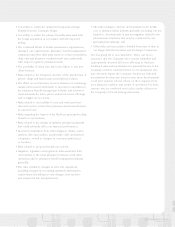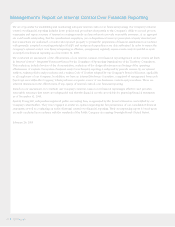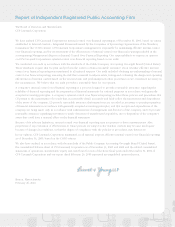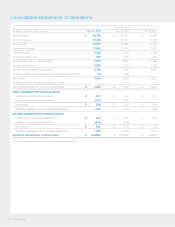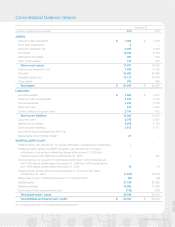CVS 2009 Annual Report Download - page 39
Download and view the complete annual report
Please find page 39 of the 2009 CVS annual report below. You can navigate through the pages in the report by either clicking on the pages listed below, or by using the keyword search tool below to find specific information within the annual report.
that both Moody’s and Standard & Poor’s considered, among
other things, our capital structure and financial policies as well
as our consolidated balance sheet, the Longs Acquisition, the
Caremark Merger and other financial information. Although
we currently believe our long-term debt ratings will remain
investment grade, we cannot guarantee the future actions of
Moody’s and/or Standard & Poor’s. Our debt ratings have a
direct impact on our future borrowing costs, access to capital
markets and new store operating lease costs.
Quarterly Dividend Increase. On January 12, 2010, the Com-
pany’s Board of Directors approved a 15% increase in the
quarterly dividend on the common stock of the Company to
$0.0875 per share.
Off-Balance Sheet Arrangements
In connection with executing operating leases, we provide
a guarantee of the lease payments. We also finance a portion
of our new store development through sale-leaseback transac-
tions, which involve selling stores to unrelated parties and
then leasing the stores back under leases that qualify and
are accounted for as operating leases. We do not have any
retained or contingent interests in the stores, and we do not
provide any guarantees, other than a guarantee of the lease
payments, in connection with the transactions. In accordance
with generally accepted accounting principles, our operating
leases are not reflected on our consolidated balance sheets.
Between 1991 and 1997, the Company sold or spun off a
number of subsidiaries, including Bob’s Stores, Linens ’n
Things, Marshalls, Kay-Bee Toys, This End Up and Footstar.
In many cases, when a former subsidiary leased a store, the
Company provided a guarantee of the store’s lease obligations.
When the subsidiaries were disposed of, the Company’s
guarantees remained in place, although each initial purchaser
has indemnified the Company for any lease obligations the
Company was required to satisfy. If any of the purchasers or
any of the former subsidiaries were to become insolvent and
failed to make the required payments under a store lease, the
Company could be required to satisfy these obligations.
As of December 31, 2009, the Company guaranteed approxi-
mately 70 such store leases (excluding the lease guarantees
related to Linens ’n Things), with the maximum remaining
lease term extending through 2018. Management believes the
ultimate disposition of any of the remaining lease guarantees
will not have a material adverse effect on the Company’s
consolidated financial condition or future cash flows. Please
see “Loss from Discontinued Operations” previously in this
document for further information regarding our guarantee
of certain Linens ’n Things’ store lease obligations.
On March 10, 2009, we issued $1.0 billion of 6.60% unsecured
senior notes due March 15, 2019 (the “March 2009 Notes”).
The March 2009 Notes pay interest semi-annually and may be
redeemed, in whole or in part, at a defined redemption price
plus accrued interest. The net proceeds were used to repay the
bridge credit facility, a portion of our outstanding commercial
paper borrowings and for general corporate purposes.
On July 1, 2009, we issued a $300 million unsecured floating
rate senior note due January 30, 2011 (the “the 2009 Floating
Rate Note”). The 2009 Floating Rate Note pays interest quarterly.
The net proceeds from the 2009 Floating Rate Note will be
used for general corporate purposes.
On September 10, 2008, we issued $350 million of floating rate
senior notes due September 10, 2010 (the “2008 Notes”). The
2008 Notes pay interest quarterly and may be redeemed at any
time, in whole or in part at a defined redemption price plus
accrued interest. The net proceeds from the 2008 Notes were
used to fund a portion of the Longs Acquisition.
On May 22, 2007, we issued $1.75 billion of floating rate senior
notes due June 1, 2010, $1.75 billion of 5.75% unsecured senior
notes due June 1, 2017, and $1.0 billion of 6.25% unsecured
senior notes due June 1, 2027 (collectively the “2007 Notes”).
Also on May 22, 2007, we entered into an underwriting agree-
ment pursuant to which we agreed to issue and sell $1.0 billion
of Enhanced Capital Advantaged Preferred Securities (“ECAPS”)
due June 1, 2062 to the underwriters. The ECAPS bear interest
at 6.30% per year until June 1, 2012 at which time they will
pay interest based on a floating rate. The 2007 Notes and the
ECAPS pay interest semi-annually and may be redeemed at
any time, in whole or in part at a defined redemption price
plus accrued interest. The net proceeds from the 2007 Notes
and ECAPS were used to repay the bridge credit facility and
a portion of the outstanding commercial paper borrowings.
Our credit facilities, back-up credit facility, unsecured senior
notes and ECAPS contain customary restrictive financial
and operating covenants. These covenants do not include a
requirement for the acceleration of our debt maturities in the
event of a downgrade in our credit rating. We do not believe
the restrictions contained in these covenants materially affect
our financial or operating flexibility.
As of December 31, 2009 and 2008 we had no freestanding
derivatives in place.
Debt Ratings. As of December 31, 2009, our long-term debt
was rated “Baa2” by Moody’s with a stable outlook and “BBB+”
by Standard & Poor’s with a negative outlook, and our commer-
cial paper program was rated “P-2” by Moody’s and “A-2” by
Standard & Poor’s. In assessing our credit strength, we believe
2009 Annual Report 35


